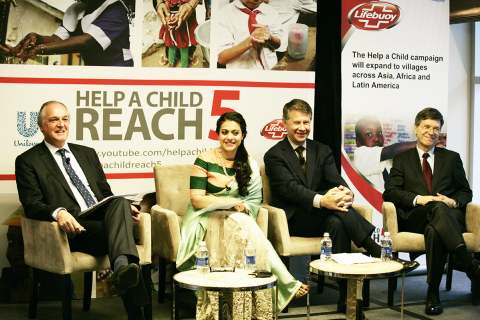NEW YORK--(BUSINESS WIRE)--Unilever’s soap Lifebuoy today called for hygiene to be recognised as a key intervention to reducing child mortality, both in the last 900 days before the Millennium Development Goal (MDG) deadline and in the post-2015 development agenda. Partnerships between business, NGOs and governments are crucial to accelerate live-saving handwashing programmes at the necessary scale.
As part of this week’s 68th United Nations General Assembly in New York, Lifebuoy gathered experts from across public and private organisations to look at how handwashing with soap can help more children reach the age of five. Key in this discussion was the role the private sector can play in accelerating progress towards the MDG which aims to reduce child mortality. Paul Polman, CEO Unilever, Jeffrey Sachs, Director of the Earth Institute at Columbia University, Karl Hofmann, President and CEO Population Services International (PSI), Pavanjit-Singh Bedi, Lifebuoy Global Brand Director, and Kajol, distinguished Indian actress, handwashing ambassador and Help a Child Reach 5 advocate, agreed that scaling up lifesaving handwashing with soap programmes must be recognised as a critical policy to reduce child mortality.
Paul Polman, CEO Unilever and member of the High Level Panel Post 2015, said: “Governments can find it hard to engage with programmes that involve behaviour change. Hygiene is an area which has been often overlooked. No business, government or UN agency can achieve the agreed reduction of child mortality alone, but by working together we can combine the expertise, resources and policy needed to achieve real change.”
Partnerships are vital in scaling-up lifesaving programmes. One great example is the global Public-Private Partnership for Handwashing with Soap (PPPHW) established in 2001. A coalition of international stakeholders, including Unilever’s Lifebuoy, whose focus is on handwashing and child health. Each year on 15 October, over 200 million people are involved in the celebration of Global Handwashing Day in over 100 countries around the world. In addition, Lifebuoy works with for example global partners such as The Earth Institute and PSI to implement its handwashing behaviour change programmes across the world, teaching children, new mothers and community leaders this lifesaving habit.
Lifebuoy has a proven model for handwashing behaviour change and has now launched its Help a Child Reach 5 handwashing campaign to improve the health of Thesgora, a village with one of the highest rates of diarrhoea in India. Lifebuoy won’t stop at Thesgora – the brand wants to expand its life-saving mission, village by village. The campaign won’t stop until child mortality due to diarrhoea is eliminated.
Kajol, award-winning Bollywood actress and Help a Child Reach 5 Lifebuoy advocate, said: “Here at the UN Summit, policymakers and governments have an opportunity to look at what needs to happen if we are to hit the child mortality reduction target by 2015. I urge those discussing the outcome and recommendations of this summit to ensure that handwashing with soap gets the recognition it needs as the most cost-effective policy we have at our disposal to achieve child mortality reduction under five by two-thirds by 2015.”
Note for the editors:
Results of Lifebuoy partnership’s with Millennium Villages Project and PSI:
In 2012, the Millennium Villages Project (MVP) and Unilever launched a new partnership to promote handwashing with soap to nearly 500,000 people in 80 rural villages and to strengthen Water, Sanitation and Hygiene (WASH) initiatives throughout the Millennium Villages. A preliminary evaluation of Lifebuoy’s handwashing behaviour change programme in the Bonsaaso Millennium Village cluster in Ghana demonstrates the effectiveness of the programme in sub-Saharan Africa.
- There was a significant, 22%, increase in handwashing among School of 5 children compared to control children.
- Their average length of handwashing with soap was also much longer and, together with frequency increase, meant they spent 40% longer washing their hands each day.
- There seems to be a spill-over into the household as well. The parents of the School of 5 children used 18% more soap than the Control.*
PSI works in partnership with Lifebuoy to implement Lifebuoy’s School of 5 behaviour change programme in Kenya and Zimbabwe. PSI has been able to use its strong links with local governments to ensure their support of this programme. In Kenya the partnership has been working to align the School of 5 programme with the Minister of Health’s Comprehensive School health policies. By leveraging the government’s support, buy in among teachers has improved, ensuring the sustainability of the programme after the initial 21 days.
- The partnership will reach over 1 million people in Kenya and Zimbabwe by the end of this year.
- Across the intervention schools in Harare there was an increase in handwashing with soap behaviour among students, from 8% at pre intervention to 74% at the end.
- In Likoni district in Kenya, students, in public schools, using only water to handwash, reduced from 62% to 26%.
Handwashing with soap is one of the most effective and low-cost ways to prevent diseases like pneumonia and diarrhoea, which prevent 2.1 million children every year reaching their fifth birthday[i]. Handwashing with soap can reduce diarrhoea by 45% and pneumonia by 23% [ii] – it is a modest yet lifesaving act which could help more children reach the age of five.
*Unilever study done in an MVP site (Bonsaaso cluster, Ghana)




